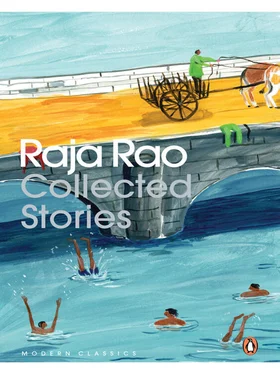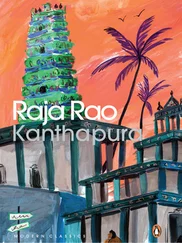Raja Rao - Collected Stories
Здесь есть возможность читать онлайн «Raja Rao - Collected Stories» весь текст электронной книги совершенно бесплатно (целиком полную версию без сокращений). В некоторых случаях можно слушать аудио, скачать через торрент в формате fb2 и присутствует краткое содержание. Год выпуска: 2014, Издательство: Penguin, Жанр: Классическая проза, на английском языке. Описание произведения, (предисловие) а так же отзывы посетителей доступны на портале библиотеки ЛибКат.
- Название:Collected Stories
- Автор:
- Издательство:Penguin
- Жанр:
- Год:2014
- ISBN:нет данных
- Рейтинг книги:5 / 5. Голосов: 1
-
Избранное:Добавить в избранное
- Отзывы:
-
Ваша оценка:
- 100
- 1
- 2
- 3
- 4
- 5
Collected Stories: краткое содержание, описание и аннотация
Предлагаем к чтению аннотацию, описание, краткое содержание или предисловие (зависит от того, что написал сам автор книги «Collected Stories»). Если вы не нашли необходимую информацию о книге — напишите в комментариях, мы постараемся отыскать её.
Collected Stories — читать онлайн бесплатно полную книгу (весь текст) целиком
Ниже представлен текст книги, разбитый по страницам. Система сохранения места последней прочитанной страницы, позволяет с удобством читать онлайн бесплатно книгу «Collected Stories», без необходимости каждый раз заново искать на чём Вы остановились. Поставьте закладку, и сможете в любой момент перейти на страницу, на которой закончили чтение.
Интервал:
Закладка:
So, led by his Gujarati Brahmin guide, Ranchoddoss found Sudha in a little brick-and-mortar hall off Hanuman Ghat, where she read the Vasista Ramayana to widows and ascetics and to a few retired judges and ex-Congress ministers, and in fact to anyone who wanted to hear this great advaitic text. And as it should happen, Sudha, on that afternoon when Ranchoddoss beheld his daughter — she was reading the story of Utpala the King. She just smiled, lifting her head, when she saw him entering the hall, right at the door, yet went on steadily reading the text. You remember the story, don’t you, of how Utpala was a great King, a good and moral king, following all the eight rules of reigning a kingdom, that is — to be generous to Brahmins, to be just, be wholly devoted to his subjects, slept little, kept all the castes under the holy laws, strict with women, kindly to children, and a great worshipper of the sages. And once when he was asleep, in his Hall of Slumber, he had this strange, strange dream. He had gone off on a hunt and had wandered far, leaving all his retinue behind, and how it happened, he could not remember, but that he was lost in the depths of a forest. He came across a hut where an untouchable was curing the carcass of a bull, outside in the courtyard. When surprised to see himself there, he was on the edge of asking the untouchable, in which province or hamlet he found himself now, when he espied a maiden fair. On course he immediately fell in love with her, and married her, and in good time she bore him a son. The years passed, years on years passed, and one day, the Prime Minister appeared, and asking said: Your Highness, we have searched for you all these times. We have searched this whole vast forest. But grace be to Shiva, we have at last discovered you, and when he was, the king was, returning back to his kingdom, he woke up and found himself on his bed in the palace. It was a dream after all. But it was deeply real. He was fully awake in his dream, just as he now was. Who was he, the king in the dream? And the untouchable and the beautiful wife and the son? Who is to decide, which is real, asked Sudha lifting up her head, smiling: who indeed? The story implies only this: Those years after all were but a few hours of one night. Life is just that. Behind both is the absolute reality, Brahman. It takes but the time a thorn takes to pierce through a lotus leaf to know the truth — so Vasista, the guru, declares it to Sri Rama, understand! It is beyond Kala, time, and Desa, space. That Reality, Sri Rama, is you, is I, said Vasistha, the great sage. And of course Sri Rama understood and immediately too for he was, Sri Rama was, is the Ultimate Reality itself. The waking state and the dream state are both states equally wakeful. What is beyond that, continued Sudha, is no state: It is the I, the I, she repeated. Ranchoddoss thinking of the king and the deer, and the Brahmin and the king again, yes, that is it, she is right, he said to himself. Sudha seemed indeed to Ranchoddoss, learned and very, very wise.
And as they walked through the busy lanes of Benares, finding a room for her father, she told her own story. Her Sadhu had passed away a few weeks earlier, she almost whispered with swelling tears in her eyes, and he had been asked by his own Guru in Badrinath, that she, Sudha, should carry on the reading of Vasista Ramayana. She was happy, she said, of her early morning baths at the Ganga, and her visit to the Shiva temple, off Harischandra Ghat, where she sat, under the ancient pipal tree behind the shrine, first saying her beads and then in meditation for four hours in rapt solitude. And then she went home to the Dashashwamedh Ghat, where in a three-storeyed house by the river, she had a large room. At her door, she explained, her followers always left vegetables, rice and firewood. She would cook her food, eat and come after a brief siesta, to the hall of the holy-readings. An oleograph picture of Shiva as Pashupathi, hung on the wall, in the middle (as Ranchoddoss had just seen) with the sacred seat, garlands and oil-lamps and all. Under the picture of Shiva, she would spread out her volume of Yoga Vasista, and after a brief bhajan, she would begin her readings, fixed for the day, adding her own humble commentaries on the text. She was no scholar, she explained, but she understood, because of the Grace of her Guru, the nature of what people say is the most difficult of all things in philosophy — Shankara’s theory of Mayavada. ‘Father,’ she said, looking at the flowing Ganga before her, ‘Father, I think I have just a chink to the door of Knowledge — to Jnan,’ And then she went up to her room, laid her book and beads on the sacred table, before her Guru’s picture, and offering her deep salutations to him, came down, and gently said: ‘Father I have not heard of the news from home. Is everybody well? I forget all about them here. But what is there to remember, anyway, and what to forget?’ She looked at her father, and on the falling evening, she saw a tear on her father’s face. A street lamp revealed it. And she understood.
Her father took a room next to hers, it was at Vishal Nivas, on the sacred Ganga of course, and by the Dashashwamedh Ghat, and he too began his meditations. She gave him just a few hints, because she was no Guru, and then one day a few months later, he and the daughter went up to Badrinath, to see her Guru (that is Sadhu Sunderanandji’s Sat-Guru) and the Guru after many words of praise for the daughter, gave initiation to Ranchoddoss. He asked Sudha’s father to read Sri Sankara’s Upadesha Sahasriyam , 1and come back to him again, and in a year. Life flows as you see, like the Ganga herself, simple and abundant, carrying princes and dancing girls, fishes and carcasses, the pyres burning on her side, reminding you that the Truth is but one indivisible flow. What is dream and which reality, then?
So that Ranchoddoss now lives in Benares, and I assure you, you cannot miss him: always as neatly dressed as in his shop, with his muslin shirt, and his dhoti falling in precise folds, sandal paste on his brow, courteous to passers-by (and Benares is not known for courtesy, as any grandmother will tell you, especially by the ghat sides). And each dawn he will wake, and saying his beads he will go down the ghat to the River. There, like Sudha, he bathes and sits on the steps for meditation, and returns to his room to cook. Once in a while the postman will have thrown in a letter from his family, or some Maharaja he’d known in Bombay will seek him out, asking him silly questions of philosophy. What does Ranchoddoss know? He knows nothing. Only Sudha knows. But Sudha will not help a Maharaja become more virile (she knows of no such miraculous mantras or trichurations) nor will she bless them that they get back their kingdom — they made such an ugly performance of it all when they had their ancient thrones, some indeed which had come down from the time of Sri Rama. Once in a while a Bombay professor or Kathiawari aristocrat will come and ask Sudha real and earnest questions. She will answer them all, even about the serpent and the rope, or the dream and waking states. And some even in that obscure nature of the deep sleep state. Sudha is happy. Ranchoddoss as you see is proud, and happy
You can still see him sit on the bank of the Ganges, as the evening begins to fall, and, as the temple lamps begin to leap from tower after tower, and the gongs begin to extone, clapping his hands gently, he will sing Shankara’s,
mano nivrittih paramopa shantihi
sa tirtha varya manikarnika cha
jnana pravaha vimaladi ganga
sa kashikaham nijabodharupaha.
The cessation of all mental activities is the supreme peace — that is the holiest of all holy places of pilgrimage, the Manikarnika (in me); the ever-flowing stream of knowledge is the pure primeval Ganges (in me); (thus) I am the Kashika, of the form of pure Consciousness of Self.
Читать дальшеИнтервал:
Закладка:
Похожие книги на «Collected Stories»
Представляем Вашему вниманию похожие книги на «Collected Stories» списком для выбора. Мы отобрали схожую по названию и смыслу литературу в надежде предоставить читателям больше вариантов отыскать новые, интересные, ещё непрочитанные произведения.
Обсуждение, отзывы о книге «Collected Stories» и просто собственные мнения читателей. Оставьте ваши комментарии, напишите, что Вы думаете о произведении, его смысле или главных героях. Укажите что конкретно понравилось, а что нет, и почему Вы так считаете.












